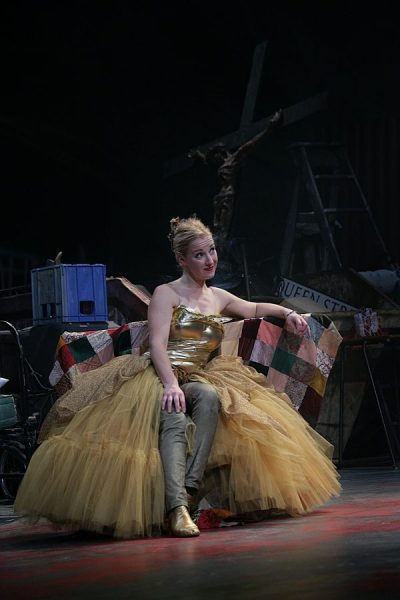Showing @ Lyceum Theatre, Edinburgh until Sat 15 Oct
Lyceum gets its autumn season underway with director Tony Cownie’s faithful adaptation of Lochhead’s renowned Scottish classic. Weaving political relevancy with fairytale storytelling, Lochhead maps out the troubled regal relationship between Elizabeth (Emily Winter) and Mary (Shauna Macdonald), a monarchical rivalry which bizarrely typifies our current deficit crisis in its attempt to show how absences motivate our decisions. As Mary’s son James is born, word passed down to Elizabeth complicates her plans to have her own King installed and seize control of Scotland.
Neil Murray’s everyday landscape fittingly modernises Lochhead’s text. Littering the stage with skips, telephone boxes, and the infamous statue with a cone on its head, Murray’s hectic set characterises a certain throwback to the days of pop art and 1950s avant-garde, a cluttered interpretation which so nimbly reflects the plethora of accents in Lochhead’s lyrical script. All too frequently however, this urbanised presentation of society has become a crutch, making indie plays out of canonical texts, an idea which David Greig plays around with so readily yet so expertly.
Lochhead has always viewed her text as a story, not to be confused with a direct historical anecdote, but also to be accepted as a piece of political satire. Cownie’s direction often reflects this, namely in his attention to the character of Corbie (Ann Louise Ross). Stepping in for the centre-stage monologue and pitching in with outsider comments on the jerkily melodramatic storyline, Ross’ humble narrator provides just enough clarification before slipping back in’tae the shadows.
And this is what the text explores: absence. It manipulates the stately relationships and uses them as a position against political gluttony and imperialism. It is a link plagued by gossip, and as we struggle against bureaucracy and rhetoric, both duelling for centre-stage in an attempt to “solve” the deficit, it is the idea of debt which motivates our behaviour. This irony is what Cownie teases out, refreshing a text which can so easily be cluttered with period costumes and dated symbolism. What remains is a play both elegantly realised and reverently staged.
